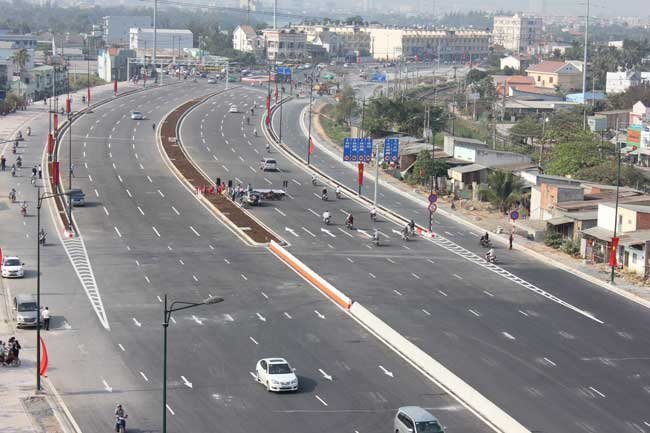 |
|
A section of Pham Van Dong Street in HCMC, built under the PPP format. The National Assembly has looked into regulations on risk sharing between the Government and investors involved in PPP infrastructure projects
|
Investors have repeatedly proposed the Government share their risks to revenue in PPP projects. The execution of these projects may last tens of years and cause cost overruns, which leaves investors hesitant to get involved in these projects.
The risk-sharing policy for PPP projects includes regulations to adjust fees, costs and contract terms.
As for PPP projects approved by the NA and the prime minister that fail to generate adequate revenue for operations, the Government proposed sharing no more than half of the difference between the actual and committed revenue.
However, investors must also share with the Government no less than half of the additional revenue compared with the committed revenue.
Minister of Planning and Investment Nguyen Chi Dung, on behalf of the Government, in presenting the draft law before the NA, stated that the policy will be applied to PPP projects under the jurisdiction of the NA and the prime minister. However, some NA deputies disagreed, saying the policy should be applied to all PPP projects.
In addition, the draft law has yet to specify the funds that will be used to address risks in PPP projects, NA deputies remarked, wondering whether funding will be sourced from the medium-term public investment plan or the fund for debt payment, as stipulated in the Law on Public Debt Management.
Some deputies even disagreed with the policy on sharing investors’ revenue risks, noting that the investors of PPP projects are chosen through auctions, so their businesses must be in line with market principles.
According to the NA’s Economic Committee, most investors, especially foreign ones, expect a Government guarantee for revenue during the execution of PPP projects. However, the Government guarantee will be adjusted, in line with the Law on Public Debt Management.
Therefore, the risk-sharing policy can be applied to ensure benefits and increase responsibility between the Government and investors.
To reduce risks related to the risk-sharing policy and ensure the transparency of the draft law, the committee asked the Government to further clarify the policy and the application of the policy to projects under the jurisdiction of ministries, agencies and localities and determine the funds that will be used to address risks in PPP projects.
The NA also required the Government to continue reviewing other regulations in the draft law to amend and supplement unclear and unreasonable regulations.
The draft law includes a regulation that PPP projects must b sizeable ones with a minimum investment of VND200 billion. The regulation is aimed at prioritizing large investment projects to attract local and foreign investors.
According to the Government, PPP projects tend to require significant investment and a long execution timeframe. In addition, the Government is seeking foreign investment in these projects, so these investors must have sufficient capital reserves.
Small projects that require an estimated investment of less than VND200 billion each should be conducted under other investment models with simpler procedures.
The NA’s Economic Committee threw its support behind this regulation but demanded further clarity on the foundation to set the minimum required investment for each PPP project at VND200 billion.
Moreover, many NA deputies said the contractors and investors associated with PPP projects should be appointed carefully as many of those with limited financial capacity have committed violations during the execution, management and operation of projects, leading to slow progress and cost overruns.
They also proposed supplementing criteria to assess the financial capacity of investors.
According to the NA Economic Committee, investors in PPP projects must be chosen through auctions, in line with the law. The appointment of investors and contractors should be minimized to prevent vested interests, losses and the selection of unqualified investors and contractors.
Under the draft law on PPP investment, limited and joint stock companies that are established to execute PPP projects must focus solely on their assigned tasks. They can issue corporate bonds to raise capital for their projects.
The NA asked the Government to review regulations on corporate bond issuance in the Laws on Enterprises and Securities to ensure the unification of the legal system and to propose detailed regulations on the requirements for enterprises and procedures to issue corporate bonds. SGT
Lan Nhi

PPP regulations to be changed to serve development
More than per 76 per cent of current investment projects following public private partnerships (PPP) are in the field of transport infrastructure, but investors still feel insecure.

PPPs take on South Korean flavour
With Vietnam as a focus of President Moon Jae-in’s New Southern Policy, South Korea is supporting the country’s development of the legal framework on public-private partnership investment.
 The National Assembly yesterday began to look into a draft law on public-private-partnership (PPP) investment, which includes regulations on risk sharing between the Government and investors involved in PPP infrastructure projects.
The National Assembly yesterday began to look into a draft law on public-private-partnership (PPP) investment, which includes regulations on risk sharing between the Government and investors involved in PPP infrastructure projects.